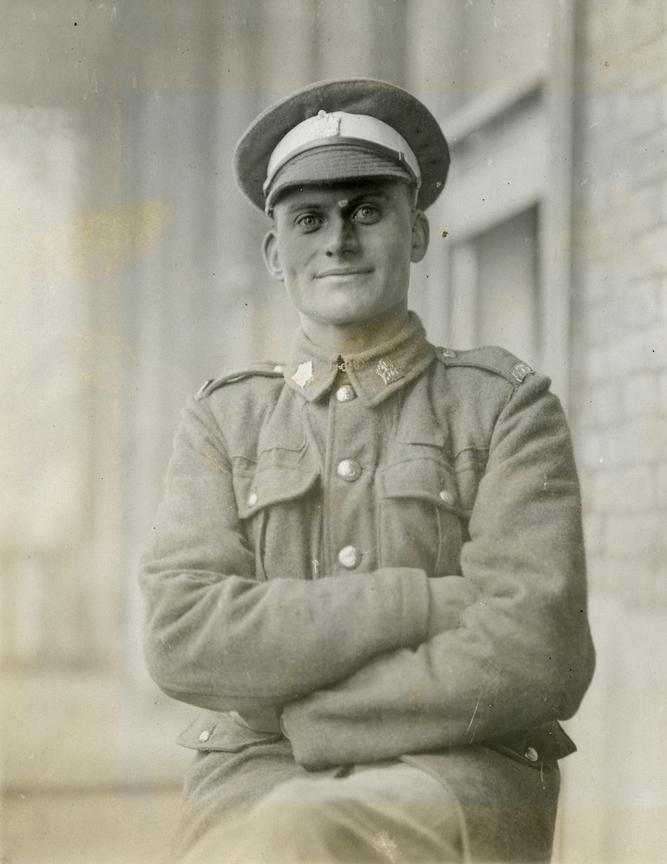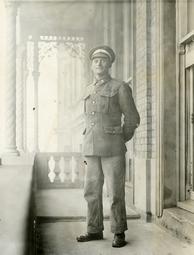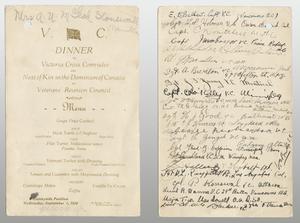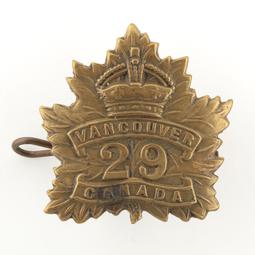Unit
29th Canadian Infantry Battalion (Vancouver)
Branch
Infantry
Service Component
Canadian Expeditionary Force
Service Number
75361
birth
1887/08/16
Kilkeel, Ireland
death
1967/06/15
Mount Lehman, British Columbia, Canada
grave
Pacific Heritage Cemetery, Burnaby, British Columbia, Canada
Gender
Male
Lieutenant Robert Hill Hanna was born in Kilkeel, County Down, Northern Ireland on 16 August 1886. He was the second of eleven children born to Robert Hill Hanna, a farmer, and Sarah (Irvine) Hanna. He immigrated to Canada in 1904 and settled in British Columbia. According to the 1911 Census of Canada, he was living on Valdes Island as the head of a household with seven lodgers and was working as a lumber foreman. Prior to the First World War, he was serving as a Lieutenant with the 11th Regiment Irish Fusiliers of Canada, an infantry unit of the Canadian Militia that was established in 1913.
Hanna enlisted in the 29th Canadian Infantry Battalion in Vancouver, British Columbia on 7 November 1914, the same day that the unit was authorized. After initial training in Canada, he and his unit sailed aboard the RMS Missanabie on 20 May 1915, bound for England. He arrived in Boulogne, France on 18 September 1915 and spent a few months as a member of a wood cutting party before rejoining the 29th Battalion on 6 January 1916. He was admitted to the No. 7 Canadian General Hospital, St. Omer on 1 April 1916 with a case of German measles, remaining there until he rejoined his unit on 15 April. He suffered a slight shrapnel wound to the cheek on 24 June 1916 and after being treated at a field ambulance, he returned to duty the same day. After attending a bombing and grenading course in late July 1916, he was first appointed to the rank of Lance Corporal on 20 August and then promoted to Sergeant on 9 October 1916. He spent nearly a month at the Canadian Corps Training School from 29 January to 24 February 1917 before returning to the 29th Battalion.
Hanna was awarded the Victoria Cross for his actions of 21 August 1917 during the Battle of Hill 70, near Lens, France. Over the course of three assaults on the German strongpoint of Hill 70, the 29th Battalion sustained heavy casualties, including the loss of all its officers. Hanna, who had been appointed to the rank of Company Sergeant-Major that same day, led the fourth assault, bayonetting three and clubbing a fourth enemy soldier with his rifle. He and his men captured the position and held it against fierce counterattacks until they were relieved later that day. Hanna was one of six men who were awarded the Victoria Cross for actions during the Battle of Hill 70, including Corporal Filip Konowal and Private Michael O’Rourke. Of the six, three were awarded posthumously to Private Harry W. Brown, Sergeant Frederick John Hobson, and Acting Major Okill Massey Learmonth.
Hanna was formally promoted to Company Sergeant-Major on 27 August 1917. Nearly a month later he was transferred to the British Columbia Regimental Depot on 23 September and proceeded to England. He was shown on command at the Canadian Training School, Bexhill as of 10 November 1917, where he attended officer training. During this time, he received his Victoria Cross from King George V at a ceremony held at Buckingham Palace on 5 December 1917. He received his commission as a Temporary Lieutenant on 26 January 1918 and was taken on strength with the 1st Canadian Reserve Battalion the next day. He was transferred to the Canadian Foresty Corps (CFC) on 24 August 1918, spending the remainder of the war serving throughout Scotland with the No. 51 District, No. 107 Company, and No. 138 Company, CFC. On 30 April 1919, he was transferred back to his original unit, the 29th Battalion, to await his return to Canada. He sailed for Canada on 10 May and was discharged from the Canadian Expeditionary Force in Vancouver, British Columbia on 24 May 1919.
After the war, Hanna returned to his life in British Columbia, resuming work in the lumber industry and later taking up farming. He married Hannah May Gillis in 1930 and the couple would go on to have two sons, one of whom died in infancy.
Robert Hanna died in Mount Lehman, British Columbia on 15 June 1967 at the age of 80, and is buried in the Masonic Cemetery of British Columbia in Burnaby.
Victoria Cross
“For most conspicuous bravery in attack, when his company met with most severe enemy resistance and all the company officers became casualties. A strong point, heavily protected by wire and held by a machine gun, had beaten off three assaults of the company with heavy casualties. This Warrant Officer under heavy machine gun and rifle fire, coolly collected a party of men, and leading them against this strong point, rushed through the wire and personally bayonetted three of the enemy and brained the fourth, capturing the position and silencing the machine gun. This most courageous action, displayed courage and personal bravery of the highest order at this most critical moment of the attack, was responsible for the capture of a most important tactical point, and but for his daring action and determined handling of a desperate situation the attack would not have succeeded. C.S./M. Hanna’s outstanding gallantry, personal courage and determined leading of his company is deserving of the highest possible reward.”
- London Gazette, 8 November 1917, Supplement 30372









